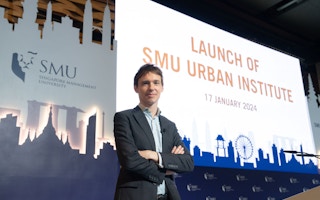A new research institute focused on the socio-cultural and economic challenges that arise from rapid urbanisation in Southeast Asia launched today in Singapore.
To continue reading, subscribe to Eco‑Business.
There's something for everyone. We offer a range of subscription plans.
- Access our stories and receive our Insights Weekly newsletter with the free EB Member plan.
- Unlock unlimited access to our content and archive with EB Circle.
- Publish your content with EB Premium.
Set up by Singapore Management University (SMU), which is located in the heart of the city-state’s built-up civic district, the new Urban Institute (UI) will consolidate the university’s urban-related research capabilities across multiple disciplines. It will also work with its three overseas research centres in Thailand, Indonesia and Vietnam with a view to conducting field studies across Southeast Asia.
Associate professor of geography Orlando Woods has been appointed to lead the centre as its director. Woods joined SMU in 2017 as a research fellow and his current work focuses on digital transformation and smart cities in Asia.
Speaking at the launch, SMU president Lily Kong said that when she took the helm at the university, she hoped that it would not only “establish its presence with a footprint in the city”, but also contribute to making Singapore a better place, and establishing the new centre is one way of doing that.
The university houses a computing school with researchers who look at urban transportation issues, as well as hires business and accountancy faculty members with strong expertise in logistics, operations and sustainability reporting, even though “they might not necessarily see themselves as urbanists”, she said. “UI aims to bridge these disciplinary divides.”
Kong recounted a conversation she had with her predecessor when she joined SMU as its provost in 2015 about the Little India riots that took place in Singapore two years before. “We are a city university, we are just around the corner (from where the rioting took place), and we have expertise on campus. We were wondering how is it that we weren’t contributing our perspectives and helping to further understanding of the event? Why were we not offering solutions?” asked Kong.
In December 2013, hundreds of migrant labourers were involved in rioting in the ethnic enclave of Little India, reportedly triggered after a private bus knocked down and fatally killed a 33-year-old worker. It was Singapore’s first riot since the 1960s and led to the authorities implementing strict restrictions and measures in the aftermath of the episode such as alcohol curbs.
Moving forward, UI will focus its work on three pillars: urban life, urban growth and urban infrastructure. Ongoing sustainability-related research includes a longitudinal study to investigate the impact of the extended producer responsibility (EPR) framework for electronic waste in Singapore, and one on electric vehicle charging.
The launch of UI adds one more institution to the range of research outfits in Singapore that focus on cities, such as the Centre for Liveable Cities and the Lee Kuan Yew Centre for Innovative Cities.
UI director Woods told Eco-Business that the centre will approach its work from a social science perspective to differentiate itself. He also sees the other research institutes, as well as universities in Asia, as partners that UI would want to work with.














